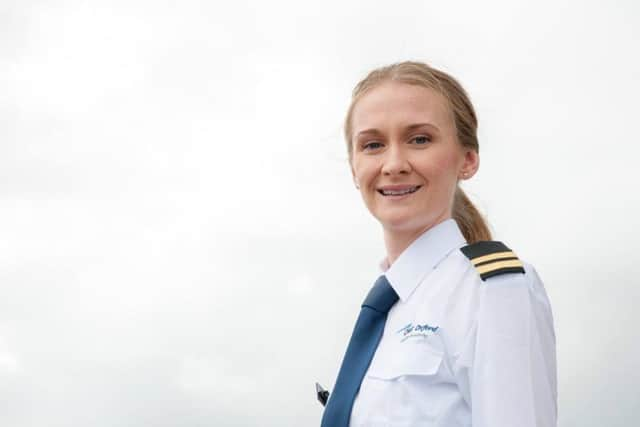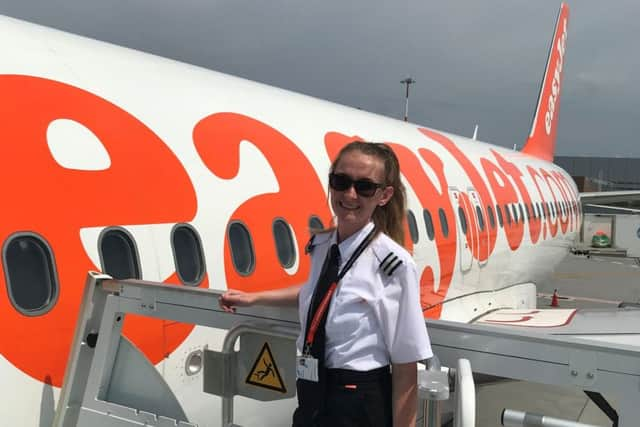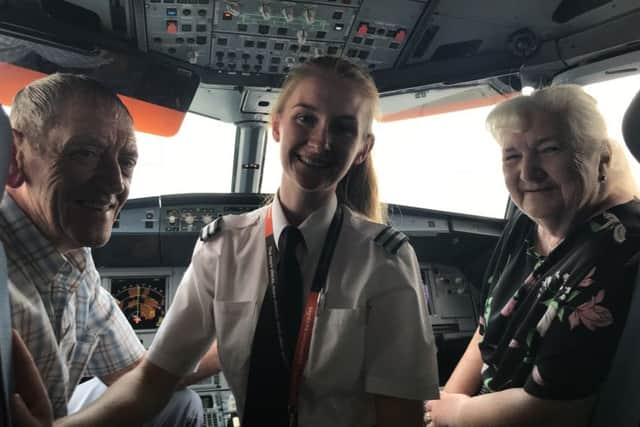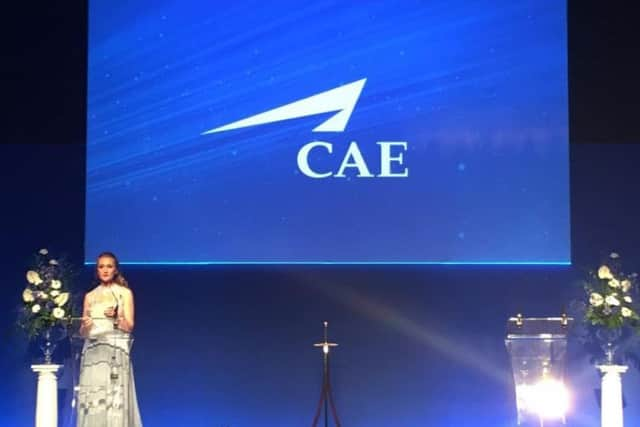High-flying Northern Ireland woman is blazing a trail for female pilots
and live on Freeview channel 276
Alex Hawthorne took to the skies when she left Waringstown in Co Down to begin a new life in Canada ... and since then she has barely been grounded.
Now the proud pilot of an Easyjet airbus 320, Alex, 29, graduated from Oxford Aviation Academy earlier this year and is based in Venice.
Advertisement
Hide AdAdvertisement
Hide AdShe lives with her Italian boyfriend Edgar, whom she met during her pilot training.


It has been 13 years since Alex left her home in Waringstown at the age of 16 to start a new life in Canada.
The move came about after her mum Alison – a flight attendant for many years – married a Canadian pilot whom she met on her travels.
They married in 2006 and the family now live in Kitchener, Ontario, roughly an hour outside Toronto.
Advertisement
Hide AdAdvertisement
Hide AdInspired by her step-dad Doug Glussich, Alex gained her full private pilot’s licence, her first step towards her dream of becoming a commercial pilot.


She said: “Mum was a flight attendant so I was kind of exposed to flying from an early age, but it was when I met my step-dad that I first thought that maybe I could be a pilot.”
She admitted that having realised her dream, it was not all plain sailing given that her profession is male-dominated: “I’m based in Venice with EasyJet. I’m the only female first officer and there’s also a female captain.
“There’s just the two females out of 80-strong flight crew.”
Advertisement
Hide AdAdvertisement
Hide AdShe said: “I do think things are going in the right direction, especially with EasyJet. They have a scholarship called the Amy Johnson initiative which offers fully paid flight training to females who they pick.


“They are trying to drive more females into it, but it is a slow process.”
She added: “It can sometimes be challenging. You feel you have to prove your worth.
“A lot of the males, the captains, are very good. They take the sex out of it. If you’re a good pilot, your a good pilot – end of story.
Advertisement
Hide AdAdvertisement
Hide Ad“Through training I felt that I had to be a little bit better than the boys because I’m a girl.


“I have unfortunately encountered a few negative comments, not from any co-workers, but from passengers. It’s been especially from older male passengers when they see a female pilot sitting in the cockpit they things like, ‘maybe I’d be safer getting a different flight’. It’s said in jokey way, they’re from a different time, but I don’t like hearing it because to me being a pilot is not a joke.
“I’ve only had two or three of those comments, it’s not a regular thing.”
Talking about the longevity of a career as a pilot, Alex said: “Pilot retirement age is 65 simply for medical reasons. You have medicals once a year until you get to over 40, then your medicals come once every six months.”
Advertisement
Hide AdAdvertisement
Hide AdShe said: “I’m very settled where I am for now. EasyJet is a fantactic company, they really look after their employees, the money is good, the benefits are good.
“To start your career flying an Airbus 320 is fabulous – it’s one of the best jets around.
“However I’ve always had my sights on going long haul. I’d love to try the Boeing ‘triple sevens’, or the 787s or even the Airbus 380s, because the bigger the better, right?
“Before my career ends I would definitely like to try a bigger jet.”
Advertisement
Hide AdAdvertisement
Hide AdShe continued@ “The longest flight I’m doing now is from Venice to Edinburgh. It’s two and half hours but from October we’ll be doing Lanzarote and Tel Aviv – those will be three and half hours each.
“The Airbus that I fly now simply wouldn’t have the mileage to do more than seven hours. To do that I’d have to go to a bigger airbus – a 380, or to the Boeing 777.”
Going back to her first time on board an airplane, Alex said: “The first time I was on a commercial aircraft was when I was four years old. I was going to Lanzarote with my parents and brother.
“I was really excited. The noise was a bit frightening, but I loved the speed of the take off.
Advertisement
Hide AdAdvertisement
Hide Ad“Back in those days you were still allowed to visit the pilots in the flight deck, so my brother and I went up with a flight attendant and I remember wondering what all the buttons were for.”
Alex is now pleased to offer the same opportunities to children: “After we land we’ll have young boys and girls coming in to the cockpit. They give you so much respect, and are so interested.
“If I could give any advice to the girls out there thinking of becoming a pilot, I’d say go for it.”
The reassuring tone of a pilot is something that goes hand-in-hand with air travel, but are the men and women in the cockpit putting on a special voice to talk to passengers or is it their actual demeanour?
Advertisement
Hide AdAdvertisement
Hide AdAlex explained: “They say everybody has a PA voice, they just want to sound as professional as they can. When I speak on board, I don’t want to come on with a really thick Northern Irish accent because nobody will understand me. It’s about clarity and getting the message across.”
She added: “Pilots don’t only do medical testing. We do psychoanalysis testing. Pilots are calm. It’s in our nature. If a bad situation occurs we need to be able to handle it quickly and efficiently.
“They’re not faking the voice, that’s their personality and how they are. That’s why they’re pilots.”
Of her own journey she said: “Training was loads of hard work. My programme with Oxford was 20 months. It’s non-stop.
Advertisement
Hide AdAdvertisement
Hide Ad“You have to say goodbye to your social life, but what’s 20 months in the grand scheme of things.
“As a pilot, I’m quite happy to be a passenger. We work hard so it’s nice for me to let someone else fly. I’m completely as ease because I know the training the pilots have been through.”
Talking of the most challenging manoeuvres she has had to carry out, Alex said: “When we went to Oxford we had to do upset recovery training.
“We went into an aerobatic aircraft which is designed to be able to do all sorts of manoeuvres.
“They put us into barrel rolls, spiral dives.
Advertisement
Hide AdAdvertisement
Hide Ad“Because we’re flying the big jets it’s very unlikely they will be able to get into a spiral dive because computer systems have protection it wouldn’t let you.
“However we always have to think of worst case scenario if these protections failed.”
She commented: “In high school my strong subjects were maths and physics, when it comes to the theory behind flying I didn’t find it too overwhelming.
“To get to spin an aircraft is a lot of fun. I feel like I’m in the red arrows.
“I’ve been in planes from a young age.
“It’s second nature to me, I don’t even flinch at it.”
Advertisement
Hide AdAdvertisement
Hide AdBut what of those people who more than flinch at the prospect of air travel?
Alex said: “EasyJet actually do have a programme from Luton once a year where they take nervous fliers up on a free flight.
“They have two pilots up front and two pilots in the cabin with the passengers explaining to them step-by-step from the take off to the landing what is happening and what are the noises you hear.
“I can promise you this, if it was completely dangerous I wouldn’t be doing it every day.
Advertisement
Hide AdAdvertisement
Hide Ad“I think it’s fear of the unknown that makes people afraid.”
Asked if there was training in place to deal with terrorist attacks, Alex said: “We do hijack training. We’re trained if anything were to happen we’re able to send out a squawk code which sends a message directly to Air Traffic Control.
“Even everyday stuff – before we push back for the taxi until we get to the gate – the cockpit door is closed and will only be open for example if we need to go to the bathroom.
“We need to call cabin crew and they need to come to guard the door if we have to leave the cockpit.
Advertisement
Hide AdAdvertisement
Hide Ad“We take measures to ensure the cockpit door will not be breached. It’s also bulletproof. They’ve changed everything since 9/11.”
She explained how she came to be stationed in Italy: “The reason why I’m in Venice is because I met an Italian called Edgar during the training.”
Alex and Edgar, 23, who is from Milan, soon became an item.
She said: “Towards the end of our course we were able to say where we wanted to go. Edgar and I said we don’t mind where we’re placed but we’d like to be together. They put us both in Venice.
“I’m still struggling a bit with the language – Italian has a lot of grammar in it. To get by I know the basics. It’s great to have an Italian speaker with me, in Italy a lot of places are remote and they don’t speak English.”
Advertisement
Hide AdAdvertisement
Hide AdAsked how much they see of each other, Alex said: “For the first year with EasyJet you’re on a flexi-roster so you can be working for three days then have two days off.
“Sometimes we’re on completely opposite shifts. He could be starting at 4am and I can be on lates working 2pm to midnight. Sometimes we’ll just see each other in the crew room, say hello and that’s it.
“Some weeks you pass each other but others we get time off together when we can do whatever we want. It’s part of the job.”
Alex said she also tried to go back to Waringstown as much as possible to visit relatives.